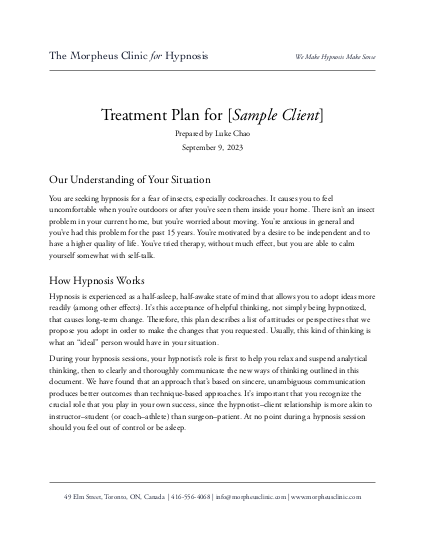 Living with a fear or phobia can be extremely debilitating. Depending on the severity, a phobia can interfere with the day-to-day aspects of your life. Even something as simple as leaving your home might seem like an insurmountable task to someone who has a fear of crowds or the outdoors. For others, making friends or meeting new people may cause such extreme anxiety that they prefer to simply stay home.
Living with a fear or phobia can be extremely debilitating. Depending on the severity, a phobia can interfere with the day-to-day aspects of your life. Even something as simple as leaving your home might seem like an insurmountable task to someone who has a fear of crowds or the outdoors. For others, making friends or meeting new people may cause such extreme anxiety that they prefer to simply stay home.
Some are luckier, because they have fears that may not affect simple interactions or day-to-day living. Fear of snakes, insects, heights, enclosed spaces: all of these are fears that do not enter our lives on a daily basis, but when we are confronted with them they can cripple us.
Whether major or minor, your fear may seem insurmountable. A part of you wants nothing more than to just “get over it,” yet you cannot. This is because fears and phobias are not based on logic or rational thought. Instead, they are driven entirely by the most powerful emotion you can experience.
Can Hypnosis Help Me Overcome My Fear?
The first thing we help you understand before beginning the process of hypnotherapy is this: you were born with only two instinctual fears. The first is a fear of falling, and the second is a fear of loud or unknown noises. Any other fears you may possess have been acquired through direct life experience, or learned from someone or something else, like a parent or a film.
When you develop fears from experience, it is largely because you once held certain misconceptions in your past about things that you may no longer believe today. Your unconscious, however, still links the fear to your past experience and gives the same response. For example, you may have been in an enclosed space and thought you were going to die, and your unconscious made a link between the stimulus of a closed room and the response of feeling like dying. Today, although you know that being in an enclosed space does not result in dying, your fear is your unconscious responding to this misconception. The role of hypnosis is to bridge the gap between the misconception in your unconscious and the understanding in your conscious mind.
When you learn and develop fears from someone or something else, it is because you have an overactive imagination. A minor fear can be exacerbated when you cling to an idea you are exposed to, and exaggerate it to such a degree that something fictitious becomes potentially real to you. For example, you watch a horror movie in your childhood about spiders that attack and kill people. Instead of thinking that it is just a fictitious movie created to frighten people, you think about those killer spiders and exaggerate their deadliness, until even the smallest, most harmless spider becomes a threat in real life.
Fortunately, results-based hypnosis can provide potent, lasting relief from phobias ranging from the commonplace to the obscure, and from the mild to the severe. There are no drugs or shock therapies involved. Instead, hypnotherapists use relaxation techniques to target the very source of your phobia, address it, and change your response to the stimulus.
Case Study: Fear of Cockroaches
Hypnosis helps you understand that the fear response is not caused by what lies in front of you, but rather by what you imagine it to be.
To illustrate this, let’s focus on the real-life case of S.A., a student who came to Morpheus Hypnosis in 2008 to seek relief from his extreme fear of cockroaches. He was about to embark on a vacation to Bangladesh, where cockroaches frequent the insides of residential houses and are significantly larger than their North American counterparts, and was understandably worried as to how he was going to handle the situation:
Just thought I’d write you an update on how I’m doing now that I’ve spent a few weeks in Bangladesh. Thanks for being able to see me on short notice before I left — and sorry I was never able to see you for a follow up as I’d hoped before I left. I have to say that I’m blown away — I never thought hypnotherapy would work that well in treating my cockroach phobia. When I first came to Bangladesh — I had that creepy crawly feeling I was telling you about. Every brush against my leg I wanted to double check to see if it was a cockroach. Things only improved — oddly enough — when I actually saw my first cockroach.
I was in the middle of eating breakfast when one dropped out of nowhere. Literally. They were silent as ever so the only sound it made was the soft thud as it hit the ground about a meter away from me. The cockroaches were just as big as I had described — this one was three inches long and about an inch wide. And, since it had flown in, it was clearly the kind that had wings. As luck would have it, I was also holding boiling hot tea at the time.
This was exactly the kind of situation I was worried about, where I might see a cockroach and react in a way that might injure myself. But, although my hand trembled, I was pretty calm. In fact, I would have to say I was more apprehensive during our “theatre visualization” in your office than I was at the sight of an actual cockroach. Not only did I not freak out, I actually tried to kill it! It was too fast and got away. Guess some things will never change.
Since then I’ve had a few opportunities to be near cockroaches. One was near my foot as I walked by a car (again I didn’t freak out). The other was just a few minutes ago. I was grabbing a late night snack when in the corner of my eye, I saw a moving shadow. I turned to look and there was a cockroach on a spot of the counter where I was working just a minute ago — its antennas moving and all. Before I could kill it, it disappeared into the shadows. Who needs ninjas when there are cockroaches?
The biggest problem now is dealing with the urge to freak out when something brushes against my leg or thigh. Writing this email with the fan blowing against my arms and legs is a good example. I want you to know you have a satisfied client — it was definitely money well spent. The icing on the cake would have to be seeing my mom (who was the staunchest opponent of hypnotherapy) freak out at a site of a cockroach while I stay steady and calm right next to her.*”
— S.A., Student, Toronto
S.A.’s Fearful Perception
Now, if S.A. had seen a cockroach for what it actually was, he would not have been afraid. Cockroaches are relatively harmless. They mind their own business, sticking to the shadows and avoiding human contact whenever possible. However, S.A.’s idea of a cockroach was different. He may have imagined that cockroaches are actively aggressive, and if that were the case his fearful response would be justified. His mother’s fear might also have compounded his fear, and ultimately, he reacted to an idea beyond what was actually there.
S.A.’s Response: Staying Calm and Staying in the Moment
The key to S.A.’s response was to remain focused on the present moment. If S.A. concentrated on a “What-If” based future scenario (“What if that cockroach comes over and bites me?”) then his response would be to become afraid. However, since S.A. kept his mind in the present (“it was too fast and got away”) he saw that he was safe and that the cockroach was afraid of him, not the other way around.
Why Are You Afraid? The Only Reason Why—And What to Do About It
 Fear is a good intention gone wrong. The reason we feel an emotion like fear is in order to protect ourselves from physical or emotional pain. In the case of a phobia, which is an irrational fear, the intention is misinformed and your response is triggered by a faulty stimulus, like a fire alarm going off because of birthday candles. The paradox is that we feel fear in order to motivate ourselves to change a current dangerous situation into a safe one. Hypnosis utilizes these positive intentions to enable a feeling of security without experiencing the fear.
Fear is a good intention gone wrong. The reason we feel an emotion like fear is in order to protect ourselves from physical or emotional pain. In the case of a phobia, which is an irrational fear, the intention is misinformed and your response is triggered by a faulty stimulus, like a fire alarm going off because of birthday candles. The paradox is that we feel fear in order to motivate ourselves to change a current dangerous situation into a safe one. Hypnosis utilizes these positive intentions to enable a feeling of security without experiencing the fear.
Fear also produces the hormone adrenalin, instigating a fight-or-flight reaction. However, adrenalin can also be created by excitement, becoming a positive force that boosts the performance of athletes. For example, a rock climber uses adrenalin to push himself physically and perform better on a rock face. Of course, since he is undertaking a pleasurable activity, it excites him. It is important to note that fear and excitement share many of the same characteristics. Both result in heightened awareness, energy, rapid breathing, an increased heart rate and sweating. Through hypnotherapy, it is possible to learn techniques to change fear into excitement that will become beneficial to you.
Fears Can Strike—and Vanish—Like Lightning: How Hypnosis Works with Fear
Your unconscious has used certain tactics in order to develop a fear. Hypnosis uses the same tactics to resolve it. Many people believe that, because they’ve suffered from a phobia for so long (in some instances, since early childhood), it will be difficult to break free of it. Take into consideration, however, how quickly that initial fear developed in the first place. In only a few minutes your perception changed dramatically, demonstrating that a person is not only capable of learning after only one experience, but also that this experience can occur very quickly. It is this exact principle that hypnotherapy employs to reverse the process. S.A. had been terrified of cockroaches for as long as he could remember, but after hypnotherapy at The Morpheus Clinic, he witnessed a dramatic improvement.
Your mind is made up of your conscious and unconscious. Your conscious mind is responsible for what you are aware of doing, such as playing chess or deciding on what to wear to work. Your unconscious mind is responsible for what you do without thinking, such as locking the door of your apartment when you leave, and then not remembering if you actually did lock it because your conscious mind was not engaged in the act.
Both your conscious and your unconscious minds observe, absorb and draw conclusions that form beliefs. The difference is that while you are aware of your conscious beliefs, you have no access to your unconscious beliefs. If your phobia was in your conscious mind, you would be able to rationalize and eliminate the fear. For instance, imagine that you hear a noise in the middle of the night and suddenly become afraid. You see it is only a raccoon outside and your fear vanishes. However, if your phobia is in your unconscious, you are unable to change it with logical reasoning.
Using deep relaxation techniques, hypnosis gains access to your unconscious mind and is able to uncover the root of your phobia. Your phobia can then be altered using motivational suggestions. It is important to remember that hypnosis is not “mind control.” Although you are completely relaxed in a state of hypnosis, you remain aware of your surroundings the entire time. You hear and understand everything that the hypnotherapist says just as if you had been having the conversation in any other setting. This means that it is impossible for hypnotherapists to “plant” ideas that you do not want or know in your head, because you hear and understand everything they say.
Is Hypnosis Right for You? If You’re Serious About Personal Change, Take the Next Step Forward
The next step is to call us at 416-556-4068 (in Toronto) or 1-888-HYPNO-24 (toll-free in the U.S. and Canada) to schedule a free initial consultation online through video conferencing or at our office in downtown Toronto. This one-hour meeting allows us to figure out how we can help you, and it lets you understand our practices and principles a little better, so that you can make an informed decision.
If scheduling is difficult for you, completing our self-directed consultation and requesting a custom treatment plan is another way to start.
Otherwise, complete the form below and we’ll get back to you with our next availabilities:
Disclaimer
* The ideal results described on this site, including testimonials, represent the outcome of an ideal client. Your results might be different, and will depend on your hypnotic suggestibility, motivation to change, past history, and many other factors that are not in our control. In addition, our work as hypnotherapists is not medical care, psychotherapy or psychological advice.

